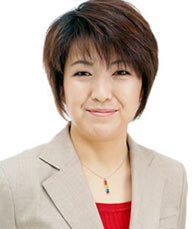Kanako Otsuji, Japan's first openly lesbian politician and one of the Democratic Party of Japan's official candidates, lost the Upper House election with 38,229 votes on Sunday. If Otsuji had won, she would've been the country's first openly gay national politician.

Otsuji's manifesto focused not only sexual minorities but also on other minorities including women, children, people living with HIV, disabled people, foreigners living in Japan and buraku people (a caste-like minority among the ethnic Japanese).
Despite these LGBT-friendly policies, the number of votes she obtained was far below the number she predicted during a speech at the Foreign Correspondents' Club of Japan in June. (related article)
Otsuji had campaigned specifically in urban areas like Tokyo and Saitama. Yomiuri newspaper, one of the country's major newspapers, wrote that the delayed party endorsement in May affected her campaign.
Asahi newspaper, Mainichi newspaper and Yomiuri newspaper, Japan's major newspapers all wrote stories on Otsuji's candidacy. Nippon TV's news program, NEWS ZERO also featured her as a noteworthy candidate. Major foreign news agencies including Reuters, AFP, AP, CNN and DPA had weighed in on whether Japanese society would accept a lesbian politician and LGBT issues as a political matter.
A gay man who voted for Otsuji told GayJapanNews that the number of votes the candidate got was less than he'd expected. "But this is the reality of Japan's LGBT community," he said.
"It is a progress for Japan's LGBT community that the DPJ endorsed Otsuji as an official candidate. However, the number of votes she gained was lower than expected and the fact that LGBT voters couldn't send Otsuji to the Diet as their representative will slow down the LGBT movement to promote visibility and equal rights," said GayJapanNews' Executive Director, Hiroshi Mochizuki.
One of the staff members at Otsuji's office told GayJapanNews on the phone that many voters might not have known a lesbian candidate was running in the election. "It's possible that voters didn't know how the proportional representation system works," she added.
In the election system, voters write either a party name or a name of the candidate. Votes with a party name doesn't help individual candidate to win.
Otsuji needed about 30,000 more votes with her name to win.
Mochizuki said the information that a lesbian candidate was running might not have reached LGBT voters who live in provincial areas. "The campaign was difficult for her because there is no firm LGBT organisation in Japan, unlike other countries where LGBT people are socially and legally recognised. We have lots of gay porn magazines, but there are few LGBT magazines that deal with political issues."
At the press conference in the early morning after the result was released, Otsuji thanked her supporters at her office in Shinjuku Nichome, Japan's biggest gay district. She added, We made a change in Japan's LGBT history. It is not the end, but the start." (Edited by Azusa Yamashita)
